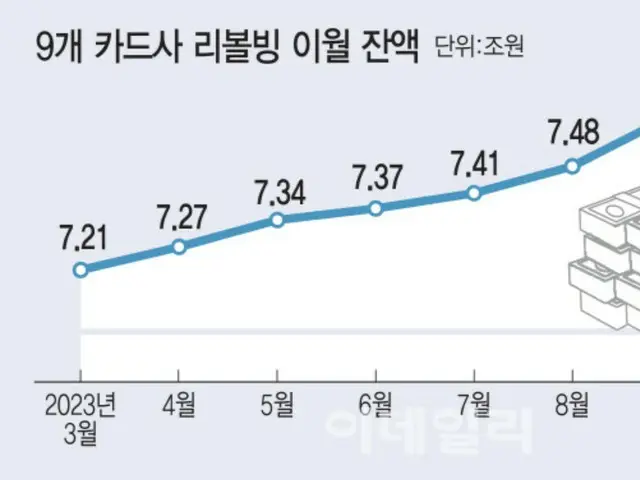was also refused. This is because financial institutions are finding it difficult to raise funds as interest rates continue to rise, and are restricting lending to people with low credit.
Kim said, ``There was no place to get a loan, so I ended up having to repay the loan.
"I applied for a rubing service," he said, adding, "With interest rates exceeding 19%, I'm already worried about my future." Last month, the revolving payment balance of credit card companies reached 7.5 trillion won (approx.
64 billion yen). Although it decreased compared to the previous month, it still maintained a high level. Revolving payment is a typical livelihood loan product, but if you use it incorrectly, you will be charged interest.
It has been pointed out that there is a risk that the number of loans will increase in a snowball manner, leading to non-performing loans for household finance. With revolving payment, you pay only part of the card charge first, and the rest can be carried over and repaid later.
It's a great service. However, the interest rate is so high that it approaches South Korea's legal interest limit (20% per year), and the loan period is short, so the risk of repayment is high.
Looking at each card company, the card company with the highest revolving payment fees is
tte card (17.88%). This was followed by KB Kookmin Card (17.53%), Shinhan Card (16.78%), Hyundai Card (16.59%), and Hana Card (1
6.46%), followed by BC Card (16.26%), Woori Card (16.06%), Samsung Card (15.65%), and NH Nonghyup Card (15.34%).
Savings banks and lenders have restricted lending due to deteriorating business conditions, and revolving payments have become the only ``stop-gap'' loan option for ordinary people. From 2021 onwards
For card loans, the debt repayment ratio (DSR) as a percentage of disposable income has been capped at 50%, raising the threshold for people with low incomes and low credit to obtain card loans. card company's
Financing has become more difficult than before, and starting in September, loan applicants with credit scores below 500 were completely blocked from receiving card loans. People with low credit have no choice but to revolving up to 20% per year.
They are forced to use short-term financing services such as payments. Experts believe that increasing revolving balances will improve card issuers' profitability, but may worsen their financial health.
It is pointed out that there is a problem. Professor Seo JIYEON of Sangmyeong University's School of Business said, ``Since card loans are included in the DSR 50% regulation, people with low income and low credit will shift to revolving payment.
``When the balance of revolving payments increases, short-term loans are redeemed quickly and fees are high, which dampens consumption and ultimately affects the national economy.''
Professor Seo went on to say, ``There is a risk that the credit card companies' health will deteriorate, and the cost of risk management such as setting up reserves will increase, which will have a negative impact on profitability.''
We need to manage the risk management," he added.
2023/11/21 07:07 KST
Copyrights(C) Edaily wowkorea.jp 107

